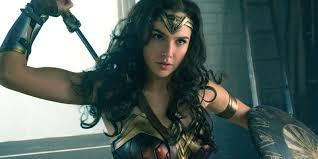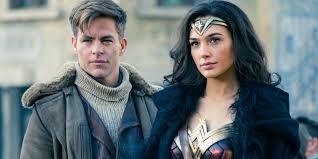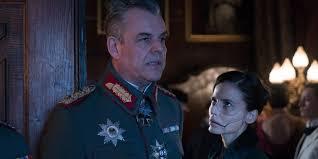
"What I do is not up to you!"
DC's attempt at aping Marvel's success with a Cinematic Universe (ugh) has been an unmitigated disaster, with dour, unwatchable trash piles like Batman Vs. Superman and Suicide Squad that everyone watched and no one liked. Until this summer's Wonder Woman (2017), which came with monstrous hype and anticipation and, fortunately, delivers on all fronts.Diana (Gal Gadot) is the youngest of a race of Amazons living on Paradise Island, born by Zeus's grace, Queen Hippolyta's (Connie Nielsen) love, and General Antiope's (Robin Wright) training. Then Steve Trevor (Chris Pine), an American spy, crash lands in the island and brings World War I to their home. Diana travels with Steve to Europe, hoping to foil General Erich Ludendorff's (Danny Huston) plan to unleash a poison gas which might turn the tide - or else destroy all of humanity. She discovers that she faces an even deadlier enemy - the war God Ares, who is playing Allies and Germans against each to destroy humanity.
Since her creation in 1941 by William Moulton Marston, Wonder Woman's offered a female toehold on the uber-masculine world of superheroes. Despite many reinventions and perversions by DC, she's remained an iconic symbol for feminism, a tough lady with an unshakable moral compass and fierce independence. Lynda Carter's television take on Wonder Woman inspired a generation of girls and women in the '70s, yet it took remarkably long for her to land a feature film. For all these reasons, it generated hype and anticipation of an entirely different sort than the usual summer blockbuster.

Partially to lessen Captain America comparisons, Wonder Woman backdates Diana's adventures from the Second World War to the First. Jenkins offers a vivid portrait of Great War's futility, from trench warfare to poison gas attacks, sparing neither side in its moral equations. General Ludendorff, a reactionary proto-Nazi who could hardly be made worse, becomes a maniacal supervillain who murders his colleagues and takes supernatural steroids to fight Wonder Woman toe-to-toe. The WWI setting prevents the easy moralizing of a Hitler-punching adventure, showing war not as good versus evil but a masculine madness threatening to destroy the world: Ares' presence is almost irrelevant.
Wonder Woman delivers on its action credentials, from the beautifully-rendered training fights on Paradise Island to the less glamorous fights in France and Belgium. The central set piece has Diana charging single-handed across No Man's Land, vanquishing an entire battalion of German troops with her sword, shield and brawn. The scene ends with Wonder Woman towering over grateful townsfolk, evoking the quasi-fascist imagery of Snyder's Superman. Yet Diana's allowed to appreciate her achievement rather than relish her power, distinguishing herself from more ambivalent colleagues.

Nailing this tricky role falls to Gal Gadot, an engaging young actress-model with limited experience. Her appearance in Batman vs. Superman didn't offer a chance to shine, but she's superb here. Gadot is breathtakingly beautiful but also unbelievably athletic, handling the physical aspects of Wonder Woman's training and elaborate fight scenes with gusto. She plays up Diana's humor and naivety without sacrificing the character's toughness, commanding our attention with skill. Gadot proves herself both a natural movie star and a fine actress.
Chris Pine offers Gadot effective support: rather than a mere foil, he's plenty heroic in his own right, from his explosive entrance and wartime adventures to a shocking exit. His posse includes Said Taghmaoui as a crafty spy, Ewen Bremner as a shellshocked sharpshooter and Eugene Brave Rock as a Native American arms dealer. Danny Huston and David Thewlis (as a weaselly British diplomat) make effective, if one-note villains; I was most intrigued by Elena Anaya's disfigured chemist, helping Ludendorff concoct the ultimate superweapon. Robin Wright and Connie Nielsen make the most of rather limited roles.
Wonder Woman shows two things, one more important than the other. Financially, and aesthetically, it shows that DC can potentially match Marvel, if their directors learn how to handle characters. The other, of course, is providing proof that female superheroes can land with mainstream audiences. If nothing else, she offers a tough yet womanly role model to girls looking for cinematic inspiration, and that's no small thing.

